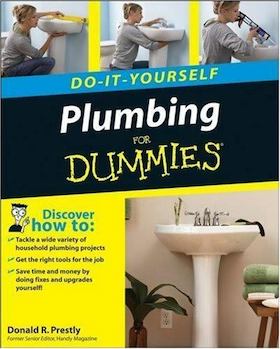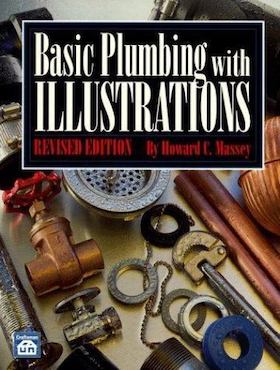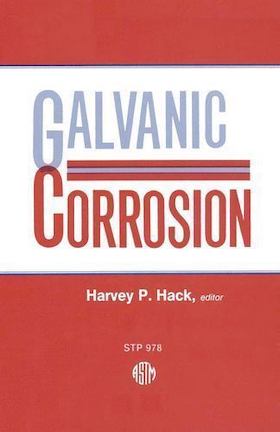
Curated with aloha by
Ted Mooney, P.E. RET

The authoritative public forum
for Metal Finishing 1989-2025

-----
Solving an electrolysis problem in home plumbing
1 2
Q. I've had multiple leaks due to electrolysis (presumed), in the same location (second story bathroom above the shower stall). Both hot and cold water copper lines leaked in different locations. The latest twelve inch piece had 5 greenish spots on the copper pipe which was replaced by the plumber (only 1 ate through the pipe). My concern is why it keeps occurring in the same location.
Ray Vella- Visalia, California, USA
July 10, 2013
Extreme corrosion in apartment complex heat exchangers and pumps
Q. We have replaced 2 of our buildings with new boilers Buderus (5). Since we have put them in we have had problems but not really bad until they hit 5 years old, now we cannot keep heat exchangers or pumps for the corrosion, even the special unions were installed because we are going copper to aluminum and the heat exchangers are so limed up you cannot get a pencil in them and the unions are corroded on the outside of them. All our lines are under a slab with pea gravel, we have checked for leaks with a infrared detector, repaired all leaks it showed, but we are still having the problem. I am going to install a ground on the plumbing because I've noticed there is none; what rod should I use and where should I ground it, which line?
Carol AdinsApartment Complex - Dayton, Ohio United States
June 29, 2014
A. It sounds like you have 2 problems. Scaling indicates that the boiler feedwater is too hard and needs to be softened. You probably also need some boiler chemicals and should contact a local supplier for advice.
The piping should be grounded, and all pipes to the boiler (feed, steam and gas line) should be grounded to the same earth ground.
consultant - Cleveland Heights, Ohio
Q. I had a plumber come out and tell me that my plumbing is not grounded and it is causing my pipes to erode. How do I ground my plumbing?
B Sills- katy, Texas, united states
July 31, 2014
A. Hi cousin B. Your plumber may be right, but I'd have been more comfortable had it been an electrician who told you this :-)
Look outside near where your electric power enters the house, and there will probably be a quite heavy non-insulated stranded copper wire attached to the end of a rod that has been driven into the ground. This is the grounding cable and ground rod. To ground your plumbing, if the plumber is right, requires putting a copper strap somewhere along the length of the metal plumbing in question, and running a copper wire from it to that grounding cable. Often there is such a grounding wire in place on the cold water pipe, just your side of the water meter. If you're unsure or you don't immediately see that ground rod, call an electrician.
Luck & Regards,

Ted Mooney, P.E.
Striving to live Aloha
finishing.com - Pine Beach, New Jersey
Q. When I touch or stainless kitchen sink or faucet, or the shower metal fixtures, I feel, for lack of better terms, a humming sensation when I lightly brush my fingers along their surfaces. I later noticed that it stopped when I touched the surface with my other hand. It only does this while standing on the tile floor. I have determined that it is electrical in nature and occurs throughout my house, and in both bathrooms. Have I lost my backup ground?
Michael Walker- Crestview, Florida, USA
August 20, 2014
Q. I have been having problems w/power arcing, have had several electricians in none could find a reason. However, we replaced several outlets & switches even put in a new ground, could this be a problem with electrolysis? Out of money and desperate any advice?
Rebecca morales- Ft worth Texas
October 15, 2014
A. Hi Rebecca. I'm completely confident that your problem is one for an electrician, not a plumber -- but I'm neither. I think you should try to contact your power company and see if they have anything to say. Large arcing sounds like excessive voltage either from some sort of short in your incoming 230 V supply (but one of your electricians would have caught that), or a power company issue.
Regards,

Ted Mooney, P.E.
Striving to live Aloha
finishing.com - Pine Beach, New Jersey
A. Rebecca, this sounds like it could be a loose neutral connection either on a multi-wire branch circuit, in the main service equipment (meter or panel), or possibly even upstream from your meter which would be a power company issue. A loose neutral connection could intermittently cause over-voltage to circuits which can damage 120-volt equipment.
Jeff MetzlerThe Electri-Serve Corp. - Denver, Colorado USA
Q. Hello, I had a house built almost four years ago. The gas in the house was turned off. When I had the gas cut back on, it wouldn't hold pressure and was unable to be turned on. My question: I called the plumbers that did the work 3 years prior -- on day 1 they found about 7 places it was leaking. It was leaking at every cuff where they met on every line. I have paid $400 so far. We are on day 3 and still leaking. They called the city to get it checked to pass and it was still losing pressure. They don't want to take any blame. I feel it was something they did when they installed and I should not have to keep paying for this? Please help: do they have some kind of code to follow? I mean me and my kids could have been hurt.
Angela Lindsey- Sherman grayson, Texas
November 10, 2014
A. Hi Angela. The problem is that 3 years is a long time, especially when the piping is out of service rather than in service as it is supposed to be. I know it's not a fair example, but if your car was left unused in a garage for 3 years you wouldn't expect it to start right up trouble-free. Please call the town and tell them of your troubles and concern -- they should be familiar with this kind of situation and be able to tell you whether it's normal or things were poorly done. Best of luck.
Regards,

Ted Mooney, P.E.
Striving to live Aloha
finishing.com - Pine Beach, New Jersey
Grounding copper pipes that have a PVC section
Q. I have copper pipes from the water source into my attic that connect to Plastic tubing and the drops into the walls are again copper. I know the outside copper pipes need to be grounded. But do I need to again ground the copper drops from the plastic tubes?
Cid CruzHomemaker - Homestead, Florida
November 18, 2014
Q. We have replaced a water heater 3 weeks ago in an older house with copper pipes. We now continue to get air in the line. We checked the gas from the faucet with a lighter and it pops, or explodes if you will; I've messed with electrolysis before with ss plates and 12 volt dc power,and get the same reaction from the gas. So, the water heater sets on concrete -- should we isolate it from the concrete, change the rod inside to aluminium, try to find stray voltage possibly passing through the unit, try to better ground the whole system?
bret sprecher- hagerstown, Maryland, usa
Q. I have a 5 year old house and in a span of 2 weeks my washer overflowed and a week later my hot water heat started leaking. I had a plumber come out and they found black pipe coming out of hot water heater. He said that this is firm of electrolysis. I am wondering now if this caused my washer to overflow also. Also my shower tub in my house keeps clogging up and my plastic wire coated dishwasher racks are rusted and falling apart piece by piece. Oh and one last thing my wife's hair is falling out. Could black iron pipe that was installed on my hot water heater be cause of all these things. What should I do?
Bodie Morgan- Rio Rancho
June 4, 2015
Q. Hallo All,
My house is located on the rural part of Tamilnadu,southern part of India. Where the house is surrounded by two wells, agricultural lands and cattle farm. The water for the household and cattle farm purposes are taken from the well and besides the agricultural land there is a river called Thirumanimuthar, which is fully contaminated. The water being used from the well for household purpose is fully contaminated by salt. Because of this problem, all the pipes (kitchen,bathroom) are rusted due to salt and outlet of water from pipe is very less. Can anyone please suggest some ideas for this problem. The solution will not only help my family but also 50 families living around us. We all facing this problem around 30-40 years.
Thanks in advance!
Regards,
Manimaran
- Salem,Tamilnadu, India
December 11, 2015
Q. Hi All,
I am also experiencing pin hole leaks in my hot water pipes (not cold water). I had a brand new System 2000 furnace and separate hot water heater installed in 2007 to replace my old cast iron boiler that had cracked. A few years ago is when the pin holes first started in the hot water pipe coming out of the HW heater. I had about an 8' section replaced with PEX (PVC) piping. In the last 6 mos, I have had 2 more pin holes pop up on the far side of the PEX away from the HW heater. I had a few more on the near side of the PEX and another on the copper directly coming out of the HW heater.
Today, I had an electrician come in to take a look at it as I had heard about electrolysis. He was very thorough and was unable to find any 'ground' issues - panel was good and grounded; he checked the light pole and outside and both were good as well; he tested the pipe and there was no difference in the HW pipe versus the cold; no wires touching or bad wiring anywere.
Any other thoughts other than getting the water tested for a chemical issue? Could it be the force of the constant circulation of the System 2K, which if I remember, once the HW heater is filled, it will send the HW to the last zone that called?
HELP?
- Bethpage, New York USA
January 14, 2016
Q. About 6 years ago we remodeled our house, including most of the plumbing system, all copper. Right after that we started noticing a blue-green deposit gradually showing up on the tile in the showers. We have had numerous plumbers and electricians look at it. One electrician re-did the grounding. They have said it could be electrolysis caused by an electrical wire not in Romex crossing over a copper pipe. Or a galvanized piece could be in there somewhere. We've had all these possibilities checked out and have been unable to find a solution. My wife's blond hair continuously has a blue-green tint to it. I suppose we are drinking the stuff, although we only drink water that goes through the RO filter. Don't know if the filter is removing it. The blue-green deposit starts to be visible on the tile after 1-2 weeks of use following being cleaned, so we are constantly cleaning it off.
There have not been any leaks yet.
Any ideas?
- Santa Barbara, California, USA
January 22, 2016
Q. Hi,
Have had periodic spitting and surging from all our faucets since a new hot water heater was installed 3 months ago. The company says it's because of hydrogen produced during electrolysis in the hot water heater because of a problem with the house's electrical ground and we should call an electrician.
Just wondering if anyone else has experienced this.
Thanks
Nick
SCORE - allentown, New Jersey USA
March 7, 2016
Q. This is a follow-up question:
Recently we had a new water heater put in, about eight months have gone by and there was some putty type stuff on both fittings at the top of the heater, a General Contractor checked it out and found that the Magnesium internal rod was quite eaten. He said that it was probably caused by the water softener salt
⇦ this on
eBay or
Amazon [affil links]
. Our water softener does not use salt, or anything else, it handles the water with a sediment filter and its own catalytic type mineral properties. But, at that time, I remembered that when the water softener was put in, it has a plastic control head, and does not carry the ground of the copper cold water pipe through the softener to the house plumbing. Also about ten years ago, we did have a new electrical panel put in, and the County had the Electrician put in a Grounding Rod, as well as ground to the cold water pipe for back-up as one person noted.
If I put a ground strap from the incoming cold water copper pipe to the water softener, and connect it to the outgoing from the water softener, to complete the circuit, would that solve the problem?
Sure hope I worded this in the right way for you all to understand.
Bob
- Temple City, California - County of Los Angeles
December 2, 2016
A. Bob,
Your suggestion might be useful but another idea is to add a jumper between the hot and cold pipes on top of the water heater.

Blake Kneedler
Feather Hollow Eng. - Stockton, California
![]() Blake, thanks for mentioning this because, when we first moved here there were copper wire straps between the hot and cold pipes under each sink, and I have been thinking about that, as well as at the hot water heater, the heater had dielectric connectors for the cold-in and the hot-out, I did check for any continuity between them, and there was some, but not a really good amount like where I put the strap between the two cold water points I mentioned in the post. Also, now a plumber thinks I am having thermal expansion in the pipes, always an adventure:)
Blake, thanks for mentioning this because, when we first moved here there were copper wire straps between the hot and cold pipes under each sink, and I have been thinking about that, as well as at the hot water heater, the heater had dielectric connectors for the cold-in and the hot-out, I did check for any continuity between them, and there was some, but not a really good amount like where I put the strap between the two cold water points I mentioned in the post. Also, now a plumber thinks I am having thermal expansion in the pipes, always an adventure:)
- Temple City, California
Q. I have a pin hole in a pipe from electrolysis from a copper to galvanized junction without a dielectric union. My question is do I have to replace every pipe in the house that comes off of it or can I just replace the piece where the leak is?
Brandon Brookins- West Sacramento California USA
June 17, 2017
Q. A friend of mine has a 8 year old house with plastic pex pipe with brass connectors. Recently one of the brass 90's has sprung a leak, upon further inspection the inside of the fitting has been eroded to paper thin. could this be caused by some type of electrolysis? even though it is plastic pipe.
Ken Forbes- Revelstoke B.C. Canada
January 19, 2018
A. Hi Ken. The word 'electrolysis' may not be quite the best term, but "galvanic corrosion" can't occur without 2 metals in electrical contact with each other. I suppose it is theoretically remotely possible that the elbow was so poorly cast that it had areas of zinc and areas of copper reacting with each other, but my guess is far more likely that there is a chemical balance problem with the water. It's possible that your local heath department or code enforcement official or a local plumber has good knowledge of what's happening in your friend's neighborhood. Good luck.
Regards,

Ted Mooney, P.E. RET
Striving to live Aloha
finishing.com - Pine Beach, New Jersey
Q. I have a customer whose house was built in 2000. They are getting pinhole leaks all throughout the cold water piping. They have a PVC main and copper overhead, no loops. They do not have a water softener. The electric is grounded at the main shutoff for the house. I have checked the city's water quality report and they all check out back to the year built. My first diagnosis was galvanic corrosion. I did get a small, fluctuating reading with my multi-meter but when the electrician went out, he could not replicate any readings. Ideas?
Al KnightAll Knight Services, Inc. - Pompano Beach, Florida, USA
April 10, 2018
A. What we in the UK have found is that high nitrate levels in the local water supplies can cause pinholes in copper pipe after a few years. These leaks first appear as condensation and that's what people assume is the problem. The only solution is to replace the affected pipes. In the UK the local water companies pay for the pipes but not the labour !
Peter NormanRetired Engineer - Cambridge UK
November 8, 2021
Q, A, or Comment on THIS thread -or- Start a NEW Thread


